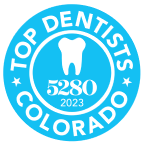
Have you recently received the news that a tooth needs to be extracted? Do you have anxiety about the procedure or how your smile will be affected? If you find yourself nodding along to these questions, rest assured you are not alone, and this is a completely normal response.
While conservative restorative methods, such as root canal therapy or dental crowns, are generally attempted first to preserve a tooth, when the damage is severe, a tooth extraction may be recommended to protect your oral health. If an unhealthy tooth remains in place, it can lead to chronic pain, gum disease, abscess, gum and bone necrosis, and other serious oral and overall physical health issues.
Our dentists at Metropolitan Dental Care perform comfortable tooth extractions at our Denver and Lone Tree locations to help patients maintain optimal oral health. Once you have fully recovered, we can discuss the right tooth replacement solution to restore your smile.
Outlined below are four reasons tooth extractions are generally recommended. To learn more, contact us online or give us a call at 303.534.2626 to schedule your consultation.
Tooth Decay or Gum Disease
Tooth decay is something we see and treat every day, in patents of all ages. While cavities can generally be repaired with composite fillings or dental crowns, when the damage is severe, or the infection penetrates the underlying layers of the tooth – an extraction is sometimes necessary.
Unaddressed tooth decay can also lead to gum disease, a chronic bacterial infection that causes soft and hard tissue degeneration. As the infection spreads, it places bodily health in grave danger. In recent years, studies have shown how the mouth and body are interconnected. An untreated oral infection can exacerbate diabetes and heart disease, and even contribute to stroke. By removing an unhealthy tooth and treating the infection, a dentist can help preserve your oral health and your life.
Unsuccessful Root Canal Therapy
Root canal therapy is typically recommended as a conservative, last resort to preserve an internally infected tooth, so that it does not have to be extracted. While this treatment allows individuals to maintain the natural tooth and their occlusion (bite) remains intact, root canal therapy is not always successful. Failed root canal therapy can result in ongoing pain, infection, and difficulty performing basic dental functions.
A tooth extraction can be performed to remove the damaged tooth and eliminate discomfort. Any associated infection and/or abscess may be addressed once the problematic tooth is gone and the site is open.
Preliminary Treatment for Orthodontics
Your baby teeth help as you learn how to speak and chew, and serve as a placement guide for your permanent teeth. However, if they fail to fall out on their own, it can cause your permanent teeth to develop in a crooked position. Small mouths and inadequate spacing can also result in impacted or overlapping teeth. In either of these cases, tooth extraction may be recommended to create sufficient spacing for permanent teeth. Oftentimes, extraction precedes orthodontics to create adequate space for incoming secondary teeth.
Preliminary Treatment for Dentures
Though access to care and advances in healthcare, technology, and science have greatly improved the statistics regarding tooth loss, like all human body parts, teeth age and wear out over time. Extensive tooth loss may occur as part of the aging process. When patients are missing most of their teeth and remaining teeth can no longer support a partial denture, tooth extractions prepare the mouth for a denture. A denture may be secured by natural suction or adhesive on the gums, or dental implants can be inserted into the jawbone to support an implant-retained denture.
Learn More About Tooth Extractions
We offer both simple and complex tooth extractions at our Denver and Lone Tree dental offices, to meet the unique needs of our patients. During your consultation, the dentist will perform a complete examination and explain which tooth extraction procedure will be necessary. Please contact us online to request your appointment, or give us a call at 303.534.2626.

